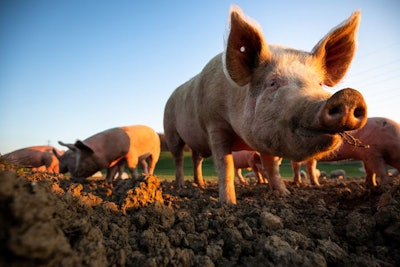
Proposed relaxation of biosecurity regulations for owners of small herds in Poland is strongly opposed due to the continuing threat of African swine fever, the nation’s pig industry associations say.
Since the country’s first outbreak of African swine fever (ASF) in 2014, Poland has been battling to control the spread of the disease in its wild and domestic pig populations. Among the latter category, the majority of outbreaks have been in small and backyard herds, and not on commercial farms. In 2022, the nation’s chief veterinary office confirmed 14 outbreaks in domestic pigs. All began between June and September, and only one large commercial herd was affected.
So far this year, no cases of ASF have been reported in the country’s domestic swine so far. However, the same source reported 855 outbreaks in wild boar already in 2023.
In a controversial move, a draft law is going through the Polish regulatory process that will lower the biosecurity requirements for backyard herds. If passed, the law will end the requirements for owners to provide basic biosecurity measures such as disinfectant mats at the entry to their property, and to keep records of pig movements.
This relaxation of the rules would apply to owners of 10 pigs or fewer, reported Swiat Rolnika. Agriculture minister Henryk Kowalczyk said ASF does not pose a threat to backyard pig farming, as long as the animals are housed. Owners will still have to comply with some basic hygiene measures, he said.
For commercial farms, biosecurity regulations have been effective, the minister asserted. There will be no changes to the rules for this sector.
Poland’s pig farming associations have expressed concerns about the proposed changes, reports Schweine, Germany’s pig industry body.
Given the ongoing ASF threat in the country, it is too early to ease the level of biosecurity applied by Polish backyard herd owners, the Polish bodies wrote to the minister. They are calling for the current standards to remain in place for all pig herds in the country.
3 European states register new outbreaks in domestic pigs
For the year so far, six countries in Europe have registered one or more outbreaks of ASF among domestic pigs.
This is according to the latest update of the Animal Disease Information System of the European Commission (EC; dated March 19).
Registering the most outbreaks in this category is Romania with 48 so far this year. Next comes Serbia — now with 22 reported outbreaks since the start of January. Moldova’s total stands at 14.
Earlier this year, the EC was notified of two outbreaks in Ukraine, and one each in Germany and Italy.
Further detail is provided by notifications from the national animal health agencies to the World Organisation for Animal Health (WOAH).
Over the past 10 days, Serbia’s veterinary agency has confirmed to WOAH nine new ASF outbreaks. Each of the herds affected between January 31 and February 25 comprised between one and 39 animals. As in recent outbreaks, these latest herds were in the southern district of Pcinja or in Pomoravlje in central Serbia.
Affecting a total of 28 pigs, the five latest outbreaks in Romania were in small herds in the southern and central counties.
In Moldova’s district of Soroca, the first ASF outbreak has been confirmed since June 2017. According to the WOAH notification, 24 pigs died out of a herd of 147 at a premises in mid-March. Source of the infection in this Northern Region district is unknown.
Meanwhile, the Moldovan animal health agency has declared the ASF situation “resolved” in the Southern Region district of Leova. During the month of February, presence of the virus was confirmed in five small herds in two adjacent villages — a total of eight pigs.
ASF cases in European wild boar pass 2,600
Already this year, the total number of ASF outbreaks across Europe has reached 2,620, according to EC’s information system (as of March 19). Sixteen countries have registered one or more such outbreaks through this system since January 1, including 12 nations since the EC’s last update dated March 10.
Registering the highest number of outbreaks in this category so far this year is Poland. With an increase of 65, the Polish total has reached 875. It is followed by Germany (now with 432), Italy (247), Slovakia (227), Hungary (191) and Romania (161).
Also reporting new ASF outbreaks to the EC System since the previous update on March 10 were Bulgaria, the Czech Republic, Latvia, Lithuania, Moldova and Serbia.
Over the past 14 days, Poland’s veterinary authority has notified WOAH about 152 cases of ASF in wild boar. Up to March 17, the Polish veterinary office had recorded 855 outbreaks so far in 2023.
Since ASF was first detected in Germany in September 2020, virus-positive cases in the country’s wild boar stand at 5,199. This is according to the national veterinary agency, the Friedrich-Loeffler Institute (as of March 31). The figure includes 78 cases confirmed over the previous 28 days.
At the end of March, the Czech Republic’s state veterinary service reported that one more wild boar had tested positive for the ASF virus. It was the country’s 10th case since the disease returned to the country in December 2022. All the infected animals have been found in the same part of the northern region of Liberec.
ASF developments in Russia
While the EC does not report the disease situation in Russia, the national veterinary authority has registered with WOAH more ASF cases in domestic pigs and wild boar.
Involving 67 more pigs and a further 79 mortalities, these were confirmed at previously reported outbreaks in Kaliningrad. This oblast is located in Russia’s Northwestern federal district.
Furthermore, one wild boar found dead in the same region has tested positive for the ASF virus. This brings the region’s total cases in this population since July of last year to 12.
View our continuing coverage of the global African swine fever situation.
















